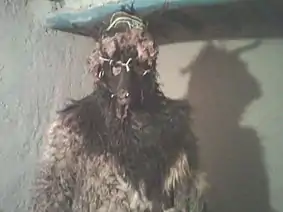Bujlood
Bujlood (بوجلود father of pelts or بيلماون or ⴱⵉⵍⵎⴰⵡⵏ) is a folk Amazigh celebration observed annually after Eid al-Adha in parts of Morocco in which a person or more wears the pelt of the livestock sacrificed on Eid al-Adha.[1][2][3]

Etymology
The term Bujlood comes from the Arabic أبو abu (meaning father, or possessor)[4] and jlood جلود (plural of jild جلد, meaning skin, leather, or pelt),[5] so bujlood means father or possessor of pelts.
Observance
The celebration begins with a bujlood carnival, usually on the day after Eid al-Adha, when young people wear masks and the skins of the sheep or goats that were sacrificed on the Eid. They dance around in their masks and costumes carrying limbs of the sacrificed animals, which they use to play with people they run into and trying to touch them. The point is to spread laughter and cheer.
References
- "انطلاق كرنفال "بيلماون" بإنزكان المغربية". الجزيرة مباشر (in Arabic). Retrieved 2019-10-19.
- "Boujloud: Morocco's unique Halloween". www.aljazeera.com. Retrieved 2019-10-19.
- "Boujloud, un rite en mal de valorisation". www.leseco.ma | L'actulaité en continu. Retrieved 2019-10-19.
- Team, Almaany. "تعريف و شرح و معنى أبو بالعربي في معاجم اللغة العربية معجم المعاني الجامع، المعجم الوسيط ،اللغة العربية المعاصرة ،الرائد ،لسان العرب ،القاموس المحيط - معجم عربي عربي صفحة 1". www.almaany.com. Retrieved 2019-11-21.
- Team, Almaany. "تعريف و شرح و معنى جلود بالعربي في معاجم اللغة العربية معجم المعاني الجامع، المعجم الوسيط ،اللغة العربية المعاصرة ،الرائد ،لسان العرب ،القاموس المحيط - معجم عربي عربي صفحة 1". www.almaany.com. Retrieved 2019-11-21.
- ""كرنفال بيلماون" .. احتفالية أمازيغية بطعم التعايش والتسامح – فيديو وصور" (in Arabic). Retrieved 2019-11-21.
| Wikimedia Commons has media related to Boujloud. |